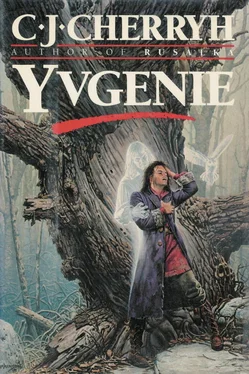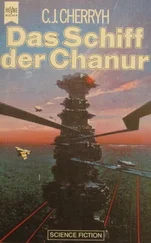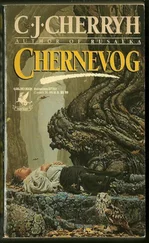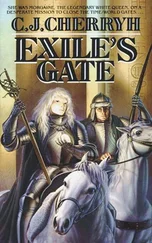C. Cherryh - Yvgenie
Здесь есть возможность читать онлайн «C. Cherryh - Yvgenie» весь текст электронной книги совершенно бесплатно (целиком полную версию без сокращений). В некоторых случаях можно слушать аудио, скачать через торрент в формате fb2 и присутствует краткое содержание. Город: New York, Год выпуска: 1992, ISBN: 1992, Издательство: Del Rey, Жанр: Фэнтези, на английском языке. Описание произведения, (предисловие) а так же отзывы посетителей доступны на портале библиотеки ЛибКат.
- Название:Yvgenie
- Автор:
- Издательство:Del Rey
- Жанр:
- Год:1992
- Город:New York
- ISBN:0-345-37943-8
- Рейтинг книги:4 / 5. Голосов: 1
-
Избранное:Добавить в избранное
- Отзывы:
-
Ваша оценка:
- 80
- 1
- 2
- 3
- 4
- 5
Yvgenie: краткое содержание, описание и аннотация
Предлагаем к чтению аннотацию, описание, краткое содержание или предисловие (зависит от того, что написал сам автор книги «Yvgenie»). Если вы не нашли необходимую информацию о книге — напишите в комментариях, мы постараемся отыскать её.
Yvgenie — читать онлайн бесплатно полную книгу (весь текст) целиком
Ниже представлен текст книги, разбитый по страницам. Система сохранения места последней прочитанной страницы, позволяет с удобством читать онлайн бесплатно книгу «Yvgenie», без необходимости каждый раз заново искать на чём Вы остановились. Поставьте закладку, и сможете в любой момент перейти на страницу, на которой закончили чтение.
Интервал:
Закладка:
C. J. Cherryh
YVGENIE
THE GHOST BOY
Eveshka had a dreadful impression of danger. She ran across the yard and headlong down the slope to the ferry dock, toward the river. Past the gray, weathered boat she ran, then down the overgrown shoreline, fending her way through reeds and a thin screen of young birches.
Her daughter Ilyana was standing there, wrapped in mist. Two lovers, one mortal, one—a ghost.
“Ilyana!” Eveshka threw up an arm to ward off the white owl that flew at her. It whisked away, shredding on the winds.
“Mother!” Ilyana gasped, while the ghost, the very familiar ghost, turned to face her with a familiar lift of the chin.
Young. Oh, yes, he would be that with Ilyana. She remembered him that way in her father’s time.
“Get out of here!” she cried. “You’ve no right here. You’ve no claim on my daughter, Kavi Chernevog!”
1
The white owl flirted a wing past Ilyana’s fingertips, a little breath of cold, a flurry of wing beats above the river and a long, sweeping glide back to the shore.
The boy, mist and shadow, waved his arm and sent Owl another course back toward her. She had met the boy when she was small, when first she had wandered alone in the woods, in the days when leshys still visited them. A fey, sad little boy had turned up sitting on an old log, and scowled at her when she came near—but curious, she had felt that from the first moment she had seen him; and a little girl who had no other child to play with had not minded the scowl. She had been very clever in her approach: she had shown him the smooth stones she had found, had let him see the jay’s feather and the snakeskin she had picked up beside the stream—how could he resist? He had examined her discoveries, he had said not a word, but he had scowled a little less, and then she had shown him how she made leaf boats, like the real boat her father sailed on the river, except her father’s had a great white sail.
The boy had put out his hand to catch her leaf boats. Bui they sailed right through.
He had come every day for a while. Then he had stopped coming, she had feared forever, and she had been desolate. But he had reappeared the next spring, and every year since, daily at the edge of summer, and fading away as the sun grew warmer.
He never spoke. He could not speak, for all she knew. He would only nod or shake his head to her questions, but they understood each other. And every year he grew older, right along with her.
To this day she had never seen another child, and she never expected to see one but him. She had heard about great Kiev, of course, and farms downriver, and she had heard of Vojvoda, the other side of the woods, where there were other children—but somehow there had always been dangers and there were very good reasons, so her parents assured her, that she should live safe in the woods, never visiting towns and cities. This might be so. She had no way to tell.
But her friend was her secret, her secret of secrets, that she had never told anyone, not even when she was small and foolish. Every springtime she looked for him, and every summer brought regret when he went away.
The springtime they both were twelve, he had brought Owl with him. Owl had looked at her with pale, mad eyes, ruffled up, immediately turned his back, and refused for all that visit to face her except over his shoulder.
It had been three years now—they were both, perhaps, fifteen. Owl still held his distance. Her friend mimed things to her with long, quick fingers: notice of the river, a sign to his face and toward her, a smile and a glance that could steal a heart. Owl glided up to perch as a sullen wisp against a tree trunk, and her friend shrugged, smiled shyly and offered his hand to her instead, touching her skin with the cool, faint sensation of his fingers. Ilyana, his lips said soundlessly, and he glanced down and closed his hand, as if he could no more be sure where her fingers were than she could feel his: that was as close as they could come to touching. She could gaze into his eyes, this close, but it was still the edge of daylight, and if she did not imagine very, very hard, she could see the trees and the riverside behind them. His hand about hers felt only faintly chill.
He had grown so much taller. And he looked at her with such solemnity—the way she looked at him perhaps, with all the effort it took to see her, and all the bittersweet anticipation of so short a time he could stay. He had Owl; she had Babi and Patches and all, but he always seemed lonelier than she was—being, as she was almost certain, dead.
Perhaps he had died in late spring: perhaps that was why he haunted the woods in this one short season. He might have lived near here once. Or fallen off a boat, in the days when ordinary boats had used to come this high on the river. She was afraid to ask her parents, who were very quick to guess her secrets. She was equally afraid to ask him, although he could answer her questions with nods or shakes of his head: ghosts were often ghosts, so her uncle’s tales advised her, because they had never realized that they were dead. In that case a careless word might send him away forever.
So she balanced now between the truth her eyes told her and the imagination of a touch beneath her chin, and his face near hers. Easier to feel that touch if she shut her eyes: and when she did so he dropped a shivery cool kiss on her cheek. That was nice.
On her lips, then. She opened her eyes wide and stepped hack, not sure whether that had been a joke or not—to kiss her the way her father kissed her mother.
Not a joke, she thought, by the earnest look on his face. She felt—not shivery—but warm, and shaky in the knees, and short of breath—which might be a spell or a wish. She had no clear thought in her head for a moment, a very dangerous condition, her mother and her uncle would agree.
But her friend had meant no harm, she was sure. She was halfway sure that kiss had been—very sweet, if she had not been so startled.
And now that she thought along that line, perhaps it was only another change with time—like Owl’s arrival. Like flowers blooming. Like the changes that had made her more and more aware of spring, and of the foxes’ games, and the birds’ dances and their seasonal obsession with twigs and straws. She knew what nature was; and she apprehended a very profound change in her thoughts this spring. Like a second birthday, this annual meeting, that she had waited for and waited for and sought by evening shadow, reckoning moon-phases and the rising of summer stars. This year she had plaited blue ribbons in her hair. She had worn—not her best frock for him: she was too secretive and clever for that— but a favorite one, with her own embroidery of lilies, while he appeared this year in much plainer clothing, leaner about the face and broader in the shoulders, as much a young man suddenly as she felt herself becoming a young woman. She apprehended that kiss suddenly as very much what was between her mother and her father—
And she did not think it wrong. She thought, now that she did think of it, that this year was a very reasonable time he do that—unbearable if, after so many years of growing together, he should never have begun to love her, or if in a spring with all the woods gone giddy and wild, she should have had no feeling for him at all.
Danger, her heart said, and, here friendship could end, here it might go on, but forever changed—and what if he liked it and I didn’t? Was it really pleasant, just then?
One wanted to know. One could try again. But where did one go from there?
To where the foxes went? She had no such plans. She had made no wishes one way or the other. She only thought—If I were to love, of course it would be him. There’s no one else. There never could be.
Читать дальшеИнтервал:
Закладка:
Похожие книги на «Yvgenie»
Представляем Вашему вниманию похожие книги на «Yvgenie» списком для выбора. Мы отобрали схожую по названию и смыслу литературу в надежде предоставить читателям больше вариантов отыскать новые, интересные, ещё непрочитанные произведения.
Обсуждение, отзывы о книге «Yvgenie» и просто собственные мнения читателей. Оставьте ваши комментарии, напишите, что Вы думаете о произведении, его смысле или главных героях. Укажите что конкретно понравилось, а что нет, и почему Вы так считаете.







